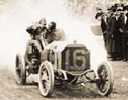Hawaiian Super Prix or Super Flop?
Much excitement has been generated since the announcement of the Hawaiian Super Prix,
a $10 million race with a staggering $5 million to the winner.
We're not going to talk about whether this event will be a financial success or the merits
of pay per view. Those are subjects for a different day. We are going to talk about whether
this race will be a success as an event.
First, let's get our prejudices out of the way. We don't like all-star events for auto racing.
We don't think they work, nor do we think they are necessary. The purpose of an all-star event is
to get the best competitors on the field at one time. In a team sport, you can (usually) get the
best two teams on the field on the same day in the championship game. However, you can never get
the best players on the field on the same day unless you have an all-star game. This works
perfectly for a team sport, and in some cases becomes an event onto itself like in baseball.
However, in an individual sport, especially auto racing, they compete against each other in
each and every event.
The only thing an all-star event does, whether it is the former Marlboro Challenge or NASCAR's
Bud Shootout or The Winston, is simply shrink the field. Who wants that? One of the biggest
complaints from fans and promoters are small fields. Fans will complain the fields are
small even if the fight for the lead is exactly the same with a ten car field or a thirty
car field. Spectators like to see lots of cars on the track at once. So, an all-star event
seems silly.
With that aside, the Hawaiian Super Prix could be looked at not as an all-star race, but
rather a playoff race. The top twelve drivers automatically make the race. Then, there are
four "at-large" bids, just like the NCAA Tournament. This can generate a lot of excitement.
Teams that are no longer in the running for the season-long championship can now remain
motivated as they fight for a playoff spot and a chance to win even more money than the PPG
Cup offers. Then, you got those teams trying to make a last minute charge to impress the
"committee" to earn an at-large bid. In this sense, the Hawaiian Super Prix not only works very
well, but has repercussions that the fans will benefit from.
In any big event, people want to know there is a clear winner. Deciding it any other way
leaves a sour taste in your mouth. Whether it be a round-robin tournament where the winner
is decided because someone else loses on the final day or a shootout that has nothing to do
with the contest itself, people will be turned off. If you are going to hand out $5 million
to the victor, then darn it, I want to know who the winner is, instantaneously and without
confusion.
The Hawaiian Super Prix will not provide that. Just the idea of splitting the event into
two parts immediately sounds the alarms. (We won't even mention the halftime show
they are proposing which makes this whole event appear to be more glitz than race similar to
the Super Bowl.)
Then, there is the scoring system. Early indications are that it will be anything but simple.
They will be awarding points for every conceivable action. Who knows, maybe bathroom breaks at
halftime will count. This has only one potential -- leaving all those watching in attendance
or at home, the race teams, and the drivers themselves totally confused. When the final laps
are running down, will anyone know what needs to be done for a driver to win? Will anyone care
anymore at that point?
Even worse, what happens when the winner hasn't even won either of the two heats? The sour
taste enters the mouth. This event is too big with too much money and hype not to provide a
clear winner. If $5 million is being given to the winner, then that winner better be the one who
crosses the line first after the second heat. No excuses. Otherwise, people may be talking about
this event, but for all the wrong reasons. Similar to the way people are talking about the
Holyfield-Lewis fight.
Copyright © 1999 by Roy Todd and Deep Throttle. All Rights Reserved.
| 



